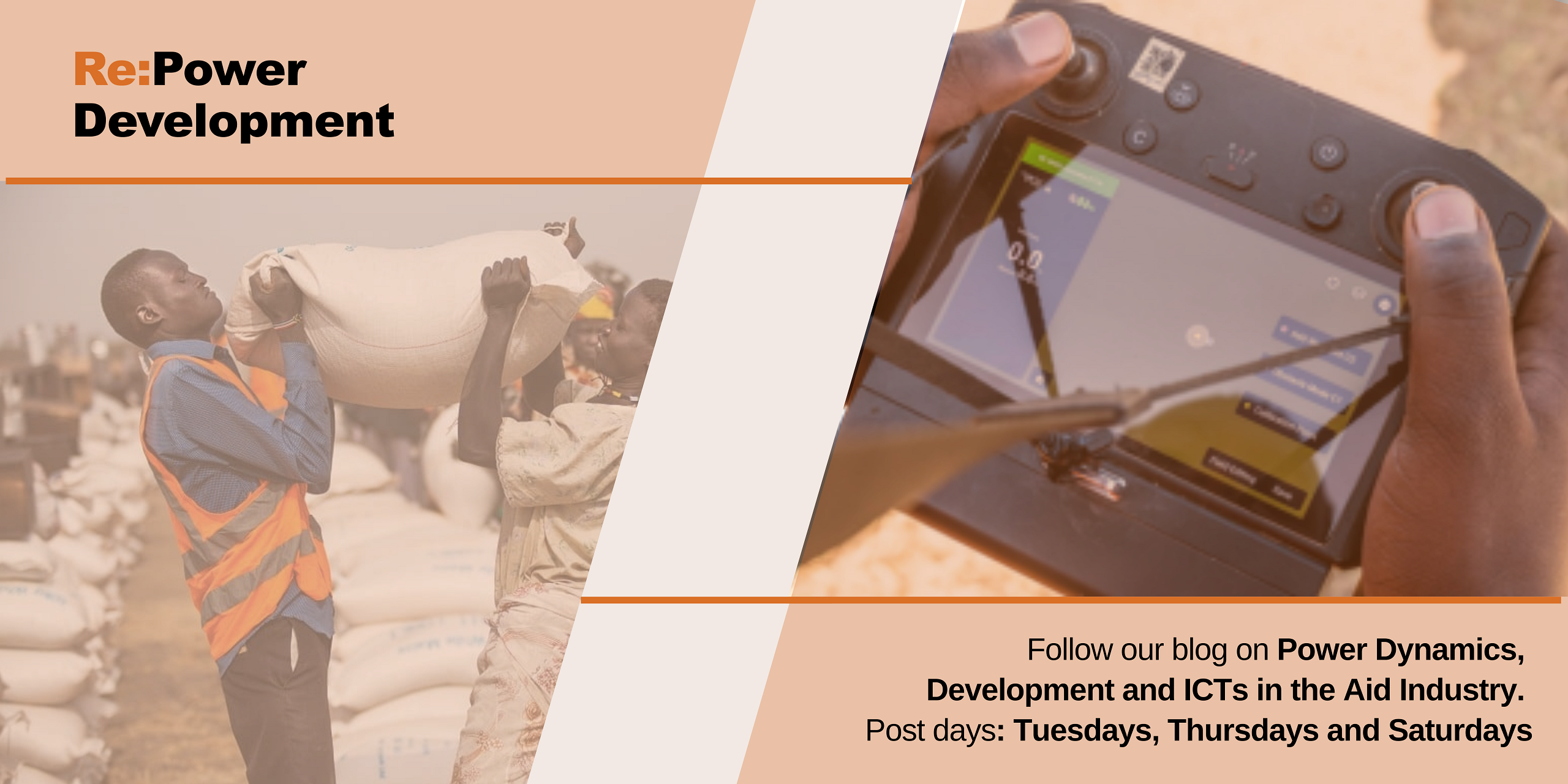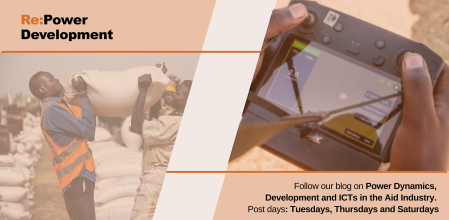
First of all, of course, a heartfelt Welcome to you and feel invited to join in with your point of view and become a part of the endeavour.
This is the first of pretty much exactly seventeen posts on this blog.
Power Dynamics, Development and ICTs in the Aid Industry
Aid organisations are often caught between opposing forces. For instance, the obligation to work fast, produce provable results and be accountable through quantitative data on the one hand. On the other hand, be inclusive and think in terms of affecting sustainable long term changes, which can be a long process to achieve, and work to have a positive impact on the lives of communities and individuals. One objective is overall to seek field-based specific solutions rather than ‘one-size-fits-all’.
Power dynamics are unavoidable, they are a part of human societies and are everywhere and that includes the aid and development sector. Postcolonial scholars and actors still struggle to disconnect colonial and imperial power structures from processes of aid delivery and organisation. Power dynamics play a role in the crucial relationship between donors and recipients of aid, between governments and aid organisations of any kind, between field workers and aided communities, researchers and their various ‘objects’ of study, so to speak, and so on and so forth.
It is important to talk about and identify them, because they inform ‘our’ decisions as actors and perceptions when we are a part of the public, who are informed about humanitarian incidents and situations of communities and individuals in need. They shape conditions and the amount of aid that recipients receive. Everything is connected. The one with the power may control any part of the aid process even down to filtering the information that anyone beyond immediately affected communities or individuals receives.
ICTs have given individuals and smaller disenfranchised communities the power to tell their story and organise. That is of course neither a one way street – people and entities already in power gain more leverage with these tools – nor is the attempt to take control of one’s own story and use it to affect change or at least highlight an issue, always a successful venture or, even rarer, leads to tangible changes. ICTs are as much a multi-edged sword as any tool is. The way they are used depends on the people who use them and their foresight and intentions.
ICTs can be employed as a force for empowerment and enrichment which gives people a voice and access they couldn’t have before or they can fuel discrimination and be used as an extension of exploitative practices, a tool for profit maximisation which controls data and information flows to the detriment of participatory approaches, which in result reinforces already established uneven power structures.
Our individual topics will be centred around power dynamics and ICT4D in the aid industry.
Among other topics, we will discuss the role which ICTs can serve in rescuing refugees, for democracy of an England after the sudden death of Queen Elizabeth II, an event regarding ICT4D and the conclusions which can be drawn from it, the practical use of mobile apps in the aid sector and how to effectively communicate about power dynamics.
We hope that you will enjoy our work and want to participate in our discussions about power dynamics, development, the aid industry, ICTs and the connection between them.
We are Master Students and study Communication for Development at Malmö University in our second year. We five, the voices behind this blog, are an intercultural group of Students from places all over the world and have a variety of interests and professional backgrounds. We came together for this project, which is a part of our Programme, and will run this blog from September until November 2022.
Nina Jerak: Slovenian communication specialist currently working for the United Nations Volunteers. With my BA in Media and Communications and MSc in International Studies, I have a profound passion for communication in the humanitarian sector, especially when it comes to using social media for good. Currently based in Lisbon.
Zahra Naderi: working in the International relations of the Ministry of Information and Communication Technology of Iran as an International Relations Specialist for more than 15 years and as the contact point of the relevant Ministry with the International Telecommunication Union.
Sylvia Nadi: aspiring writer with an interest in learning about ways which lead towards organic change for more equitable global societies, the mechanisms behind counter-movements, identity formation and many other matters. I’ve been living in Hamburg since 2017.
Eman Omran: a student of communication, by choice, by belief, by faith. I am a world explorer, by heart. I have a favourite quote that I believe in; “The world is a fine place and it’s worth fighting for.”- Ernest Hemingway. How do we fight for a better world? Only through bridges that communication builds.
Clelia Vegezzi: avid reader since childhood, passionate storyteller and photographer, graduated in architecture, working as Communication Officer for an international NGO, based in Kampala since 2015.
Schedule
To make it a little easier for you to start a dialogue with us and share your opinions on our topics, we have set our main publishing days to Tuesdays, Thursdays and Saturdays. For the next about six weeks we will publish two, three posts weekly.
See you then!

